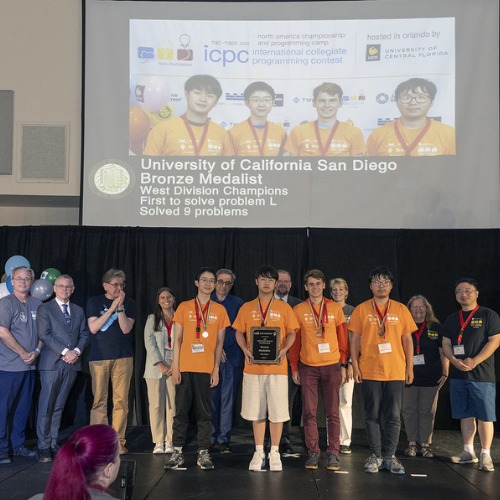
By Kimberley Clementi
UC San Diego engineering students Thomas Li, Stanislaw Strzelecki and Shang Zhou will represent the university this November at the 47th International Collegiate Programming Contest (ICPC) World Finals in Sharm El Sheikh, Egypt. The three-member team, competing as Fallen Star, earned a spot on the world stage after receiving a bronze medal in the ICPC North America Championship. Before that, the team had placed first in the Southern California Regional round.
Much like an Olympic Games for the world’s brightest collegiate minds, the ICPC is the oldest and preeminent algorithmic programing contest, with roughly 5,600 teams from more than 80 countries competing annually in several elimination rounds. No more than 140 teams reach the ICPC World Finals.
At the North America Championship hosted by the University of Central Florida, UC San Diego’s Fallen Star team surpassed competitors from Stanford, UC Berkeley and Massachusetts Institute of Technology – the reigning champions from the 45th ICPC World Finals – to earn a coveted spot in this year’s finals. Fallen Star solved nine out of thirteen challenging algorithmic problems in five hours. They were the first to solve problem “L” – a complex game theory problem – among all 51 competing teams.
“This achievement has not only boosted our confidence but has also fostered a growing tradition of winning within UC San Diego,” said Computer Science and Engineering (CSE) PhD student Zihan Wang, who co-coaches Fallen Star with Qihao Ye, a PhD in UC San Diego’s math department.
Wang knows from experience what it takes to put together a winning team. He and two teammates, Shuxin Chen (MS ’22) and Haihao Sun (BS ’21), represented UC San Diego in the 2021-22 ICPC competitive season and clinched an invite to the World Finals when they took sixth place in the North America Championship. Unfortunately, the pandemic cut their season short.
Although Wang’s bid for a world championship was disrupted, his team’s success launched a winning streak for UC San Diego. During the past three years, university teams have won regionals and west division championships twice, and Fallen Star is poised to be the first UC San Diego team in the ICPC World Finals since 2011.
“The success of Fallen Star is a potent blend of dedication, a desire to excel and remarkable teamwork,” said CSE Professor Jingbo Shang, who joined the leadership of the campus ICPC club in 2022.
While competitors typically train three to five hours weekly, members of Fallen Star devoted close to ten hours a week to practice as a team, according to Wang. During these sessions, the team worked through sample problems and strategized how to leverage their strengths, adjust roles mid-competition, and effectively manage their time – all while sharing a single computer.
As Fallen Star begins training for the ICPC World Finals, they will need to adjust their approach. Li, Strzelecki and Zhou hail from three different continents – North America, Europe and Asia. By necessity, each team member will spend summer break practicing individually from their hometowns, honing skills in mathematical reasoning, game theory, coding and error-free implementation of data structure. Once they reunite in San Diego for fall term, team practice can resume. The team also plans to participate in joint practices with Georgia Institute of Technology and University of Illinois Urbana-Champaign, fostering a spirit of collaboration and mutual respect among peers.
ICPC’s 46th and 47th World Finals will be held simultaneously in November.

